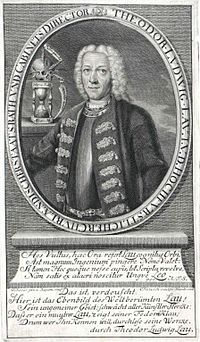Theodor Ludwig Lau
Theodor Ludwig Lau (Königsberg, East Prussia, 15 June 1670-Altona, February 1740) was a German lawyer known for his radical writings.[1] He adopted a materialistic-and pantheistic interpretation of Spinoza's Ethics shared by Friedrich Wilhelm Stosch.[2]

Theodor Ludwig Lau (1670–1740)
Works
- Meditationes philosophicae de Deo, Mundo, et Homine (1717)
- Meditationes, Theses, Dubia philosophico-theologica (1719).
- Entwurf einer wohleingerichteten Polizey (Frankfurt-Main 1717)
gollark: Wikipedia says:> The National Institutes of Health says there is no known way of preventing myopia, and the use of glasses or contact lenses does not affect its progression.
gollark: How are they hassle-free? You have to carry them around and not randomly break them and stuff.
gollark: Hmm, hopefully laser eye surgery will decline in cost over the next few decædes!
gollark: ħ
gollark: Pro-glaßes propaganda!
References
- Jonathan I. Israel Radical Enlightenment:Philosophy and the Making of Modernity 1650-1750 2001 Page v "Theodor Ludwig Lau (1670–1740) In the wake of Knutzen, Tschirnhaus, Stosch, and Wachter, the next radical thinker to provoke outrage in Germany was Theodor Ludwig Lau.163 Born and raised in East Prussia, Lau's father had been a ..."
- David Bell, Spinoza in Germany from 1670 to the age of Goethe 1984 Page 15 "... it to be atheistic and hostile to religion and the established order. Similarly, the crass materialistic-pantheistic misinterpretation of the Ethics was shared by both Friedrich Wilhelm Stosch (1646-1704) and Theodor Ludwig Lau (1670-1740)"
This article is issued from Wikipedia. The text is licensed under Creative Commons - Attribution - Sharealike. Additional terms may apply for the media files.